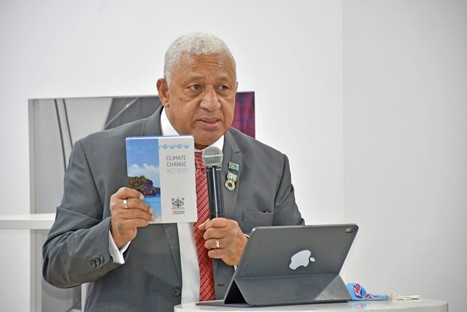Fiji made history when it enacted the Climate Change Act of 2021. This legislation formalizes Fiji’s national commitment to the Paris Agreement and response to escalating climate risks. The Greenhouse Gas Management Institute (GHGMI), through Fiji’s Initiative for Climate Action Transparency (ICAT) project, provides technical support to improve Fiji’s monitoring, reporting, and verification (MRV) capacity for estimating agriculture sector GHG emissions. With GHGMI’s support, Fiji is establishing an institutional MRV system for the agriculture sector, including steps to align this system with their Climate Change Act and the Enhanced Transparency Framework of the Paris Agreement.
Fiji, like many other small island developing states, faces challenges when it comes to planning, implementing, and monitoring climate action such as limited staff in key government ministries, difficulty accessing financial resources, and geographic and technological obstacles to improving capacity. To overcome these gaps, it is necessary to enhance institutional, human, and technical capacities. The Fijian government has embraced the support provided through the ICAT project to enhance capacity.
To implement Fiji’s ICAT project, GHGMI is providing technical support and training to build national experts’ capacity and strengthen the governance structures and processes to improve agriculture sector MRV within the national GHG inventory. The technical support and training are centered on the transparent, accurate, consistent, complete, and comparable reporting principles that are core to improving MRV and reporting outcomes from the national GHG inventory.
Overview of the Climate Change Act of 2021
The Climate Change Act of 2021 (“the Act”) recognizes that cross-sector coordination and collaboration must be part of the institutional arrangement to support the national inventory development process. The Act provides clear mandates to the Minister, the Director of Climate Change, and the National Climate Change Coordination Committee (“the Committee”) who will govern Fiji’s national response to climate change. The Committee is established under the Act to facilitate intra-governmental cooperation on climate action. The Act also provides for the integration of climate change within all government sectors through the appointment of focal points within each ministry, who must report bi-annually to the Director of Climate Change on the implementation of the Act within their ministries.
Through the Act, Permanent Secretaries of key ministries will be responsible for estimating and compiling data related to emissions and emission reduction activities within their ministerial authority. Each Permanent Secretary tasked to complete these GHG inventory objectives, must submit the estimates and compiled data to the Committee. The framework established through the Act forms the basis for the selected key ministries to integrate national GHG inventorying processes including activity data collection and capacity building, as part of their regular operations. As the ministries begin to operationalize the work established under the Act, capacity gaps and needs will arise which will need to be addressed to continue Fiji’s progress towards its climate action goals.
The Act provides the architecture for systematic progress, monitoring, and assessment of the urgent adaptation and mitigation goals stated in Fiji’s national commitments. The Act’s provisions will inform the Fiji ICAT project work as it progresses towards recommendations for an MRV system for the agriculture sector.
The Initiative for Climate Action Transparency (ICAT) provides countries with tailored support and practical tools and methodologies to build the robust transparency frameworks needed for effective climate action in sync with national development priorities.
ICAT is supported by the German Federal Ministry for the Environment, Nature Conservation, and Nuclear Safety, the Children’s Investment Fund Foundation, the Italian Ministry for Ecological Transition, and the ClimateWorks Foundation.
Image of Fiji islands courtesy of David Wall, 2016.


Comments